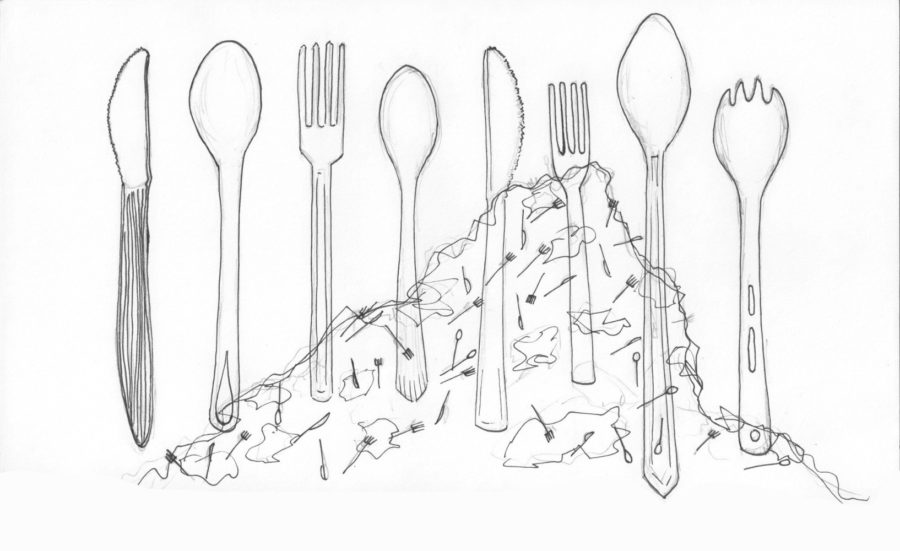The Garlick Press: Can we get rid of our plastic forks?
Alternate solutions to our plastic problem in the cafeteria

The cafeteria is bustling with students hanging out during lunch. After coming out of the doors with their food, people stop by the condiments table to get forks and spoons.
Unfortunately, some forks never get used. Why? They are littered, tossed on the floor.
Students are sometimes in a rush or sidetracked when getting their food, which consequently leads to dropped plastic utensils.
These forks and knives are bought by the lunch lady staff, and the head cook Furton, who usually buys around a maximum of 3,000 utensils each week, though the actual amount used during lunch varies.
The waste must be more manageable, or at least reduced.
One would think a solution could be using reusable silverware. For example, instead of disposable plastic sporks the cafeteria could supply dining metal utensils. Students can get forks and knives which have been cleaned by staff, and when after eating return them to the condiments table.
This in theory would result in less plastic being used by the school as a whole. However the answer isn’t that simple.
Reusable utensils do have drawbacks. It would take more time and effort of the staff to wash the utensils. It also costs to buy another dishwasher for the cafeteria’s kitchen.
Metal utensils can be hazardous, as many people would lose forks or leave them in the quad. They could also be accidentally be thrown in the trash, and potentially posed as weapons.
The staff is very stretched with time and adding another dishwasher and the task of collecting and cleaning utensils would add to lunchtimes stress.
It seems disposable silverware is the way to go – but how can our school be more efficient with the materials we use?
Another solution could be getting packaged utensil packets. This could allow students to not worry about germs from the cafeteria floor when they pick up dropped utensils.
The actual packaging creates more garbage, but may help to reduce wasted plastic in the bigger picture.
As for individual students, it is always smart to be prepared and bring your own reusable utensils from home. Planning to bring your own silverware from home even if you eat school lunches can greatly affect the overall amount of trash the campus makes, but will only work if everyone puts in effort.
Being greener as individuals may seem like more of a hassle, but these baby steps are the force working towards a brighter future.









karen • Mar 24, 2018 at 10:34 am
I find it hard to understand that you are saying here that using real reusable utensils is too much of a hassle. Don’t we use them at home? Have we really become so lazy that we can’t be bothered to wash dishes? We are teaching our kids at school to just throw everything away after one use. This is the wrong message if we have any hope of changing our wasteful ways.
anon • Nov 11, 2016 at 9:41 pm
how about sporks